Combat Interview (2001)
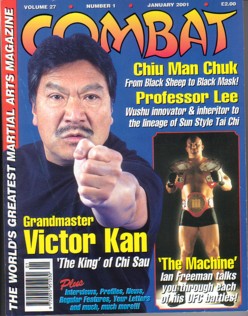
The walls of Victor Kan's school are adorned with photographs that make up a Who's Who of Ving Tsun, and Victor himself is in most of them. Solid and strong at sixty, Victor takes great pride in his lineage and the fact that he is a student of Yip Man, earning his reputation as 'The King of Chi Sao' by teaching for that legendary figure in Hong Kong whilst still only a teenager. This is Victor's 25th year teaching classical Ving Tsun in thi country and although his temperament has mellowed, his desire to promote authentic Ving Tsun has not. He accepts that the overwhelming popularity of Wing Chun and the changing attitudes of subsequent generations have led to modification of the art but is adamant that what you learn from him will always be the original article, simple to learn but hard to master.
COMBAT: Why do we see the variety of spellings in Wing Chun? For example the spelling you use is 'Ving Tsun' or Wing Tsun?
VICTOR KAN: It comes from Hong Kong as originally most of the Sifus at that time could not speak English very well. Therefore, there are differences in pronunciation and spelling according to to each Sifu, though actually it is the same style meaning 'Forever Spring'.
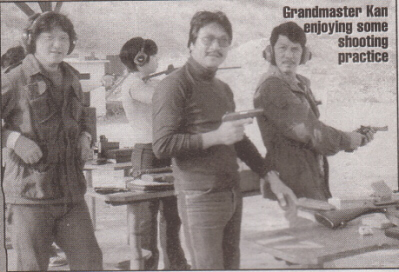
COMBAT: What does 'classical' mean as applied to your advertisments to teach 'classical' Ving Tsun?
VICTOR KAN: The Classical Ving Tsun meaning passed from one Sifu to another, from generation to generation without changing or modifying any of the movements, techniques and the way which time takes to learn. Like 'Classical Ballet', a good ballerina has to spead a lot of time and hard work learning from a good teacher in a reputable school, so that they can perform the 'Classical Swan Lake'. This has been going on for generations and will last forever - whilst the modern version of Swan Lake had appeared on just a few occasions and disappeared forever.
There are many modified and imitated versions of Wing Chun in the world nowadays. Those instructors or so-called Sifu saying that "in the 21st century everything needs to be modernised or modified". A 1950's Mercedes just cannot run faster and better than a 2000 Ford. It's true, we are in a hi-tech world - we all know that.
A hand gun can do a better job than any martial art weapon, but in Kung Fu bare hand fighting is the other way round. The old way of learning and training is the best way. Simply because that in the 'old days', people relied completely on their Kung Fu skill to defend themselves and stop other people killing them! This meant that they had to find a good Sifu and spend a lot of time practicing very hard. Classical Ving Tsun is the superior system, all my students who enter any open or private 'Chi Sao' competition always win.
COMBAT: What is the real meaning of Kung Fu?
VICTOR KAN: Kung Fu means time and energy expended on work. We can use Kung Fu as an adjective to describe the ability of a professional man. For example; if someone saying that the Chef of cuisine has not enough Kung Fu, it means that the Chef is not very good. Nowadays it is translated as 'Chinese martial art'.
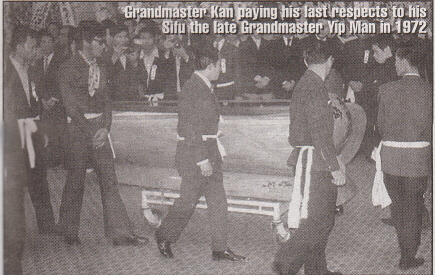
COMBAT: What are the meanings of Sifu, Sihing, Sidaih and Sijut?
VICTOR KAN: Sifu means 'teacher' and 'father', in the old days the Sifu's role was not just to teach his student the skill of his profession but also to show them the right way in life like a father. The term Sifu can be used in any profession (Kung Fu, Chef of cuisine, tailor etc.). Sihing means senior Kung Fu brother, Sidaih means junior Kung Fu brother and Sijut means Kung Fu nephew.
COMBAT: What was Yip Man's influence on Bruce Lee?
VICTOR KAN: In the mid 1950's Bruce was a very active teenager. He learned a bit here and a bit there in several different styles of martial arts. Until one day when he practiced some Ving Tsun, he was so impressed that he looked for the best instructor and he went to Yip Man to learn. His influence on Bruce Lee was so deep that later in his life he used what he had learnt from Yip Man as the base for Jeet Kune Do.
COMBAT: Just how good was Yip Man?
VICTOR KAN: I have seen Yip Man in action only once, in the mid 1950's near our school which was in a very rough area of Kowloon. One afternoon, I was on my way to the school when I saw a stocky big guy (nearly double Yip Man's size) beating his wife in the street. Yip Man told him to stop, but he didn't and instead he began to throw punches at Yip Man. Yip blocked them all with Par Sao and Bong Sao and centre attacked with chains of centre punches at his face. It was so fast - like lightening. The bully just screamed, covered his body with his hands and ran away!
COMBAT: How did you get the reputation as 'The King of Chi Sao'?
VICTOR KAN: At the same time (1957-58) I was more or less Yip Man's assistant. Yip Man was very old. That was what I call his 'blue period', and financially it was not very good. I was only sixteen or seventeen but I was big and strong for a Chinese person and I trained seven days a week, four or five hours each day. Yip Man was not physically at his best, so when students came I was the one they did the chi sao with. I would do chi sao non-stop with ten or twenty of them at one time and around thirty to forty people a day. It as never a problem, that's why they called me ‘The King of Chi Sao’.
COMBAT: Were you ever challenged in the streets?
VICTOR KAN: I don't know exactly what you mean - but I have never had a one-on-one challenge fight in the street. Maybe its because I was a big guy, but I was involved in countless street fights and gang fights in in those days in Hong Kong.
COMBAT: Why did you come to England?
VICTOR KAN: Bruce Lee went to America, William Cheung went to Australia and I came to London, England for higher education in 1960. No one had heard of Kung Fu at that time in the western world. I have worked in clubs in London since the late 1960's, I went to Hong Kong in 1971 and took part in afew Kung Fu movies. Unfortunately they made too many of them and was going down to the bottom in 1973, then Yip Man died in 1972 and Bruce Lee passed away the following year. It was in 1974 that I decided to return to London to open the first Classical Ving Tsun school - the same year in which Combat magazine was launched. Actually, I had an article in that issue and I still have a copy - it's a collector's item know! A 1/4 of a century - unbelievable!
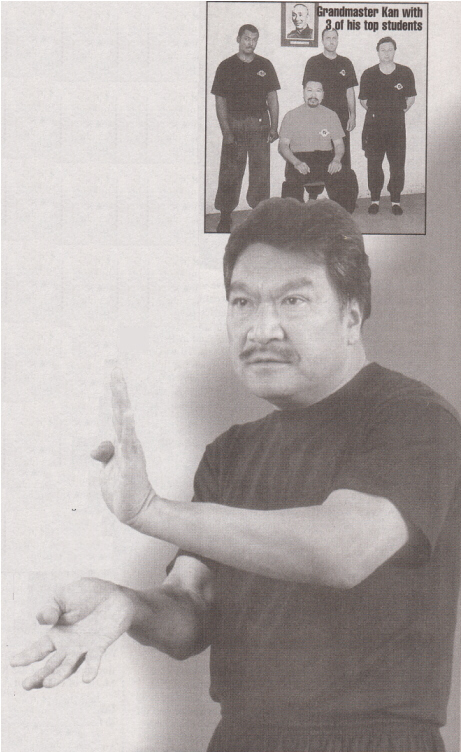
COMBAT: How did teaching in London compare with Hong Kong?
VICTOR KAN: Nowadays people don't have as much patience as they had in the old days. In London or Hong Kong it is the same, it is normal because we are living in a fast world. I must say that I have got some good students in my school who understand the traditional way in which I teach them. Most of the young people in Hong Kong are more interested in finance rather than martial arts, and those that do practise martial arts want to finish the system in one year! Even though they have a better culture and understanding background - it is just impossible, they can never be good.
COMBAT: Why is Wing Chun always so political?
VICTOR KAN: 20 years ago I foresaw that Ving Tsun would become very popular. So I tried to create a Ving Tsun International Association and keep the standard with my Kung Fu brothers. Unfortunately, as everyone had different opinions and were short-sighted it was unsuccessful. As years passed by, Ving Tsun gained greater popularity. All of the Sifus were claiming that they knew more than anyone else and that they were the best, better than the original. This meant that all of the Ving Tsun practitioners worldwide were becoming confused and the whole thing became so political. In the late 1990's, thanks to modern technology, those who had been fooled and cheated woke up and found out who was real, who was phoney and who the copycats were.
COMBAT: Are you saying that now we teach for the wrong reasons?
VICTOR KAN: People nowadays take up martial arts as a past-time, for health reasons, exercise, to impress their friends or for self-defense, but they don't seem to want to spend too much time and effort on it. This means that the modern instructors have to please them as a customer, not as a student.
COMBAT: The Chinese arts are notorious for their 'closed door' policies. What are your thoughts on this?
VICTOR KAN: I think the 'closed door' policies are history. Nowadays the doors are open and will be opened even wider in the future.
COMBAT: Can you see the day when a westerner, a Londoner even, will be the guardian of Wing Chun?
VICTOR KAN: I don't see why not - there are no barriers between nationalities or races in the martial arts world. To teach and train someone to become an instructor within Classical Ving Tsun Kung Fu is not that difficult but to find a person that has loyalty and the ability to become a Master of CVT is difficult, very difficult!
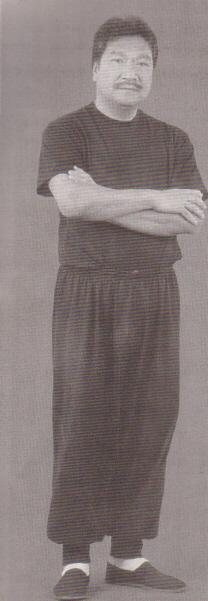
COMBAT: Can you tell us about the Wing Chun situation in the world today?
VICTOR KAN: It is more or less the same story everywhere. A person wants to learn Wing Chun, so he picks an instructor from an advertisement. If this instructor has learned the modified or imitation Wing Chun from his Sifu, and his Sifu learned that from his so-called Master, then this person obviously learned the modified or imitation version. Years later, even though they found out that what they have learned and taught was not correct or genuine they are to deeply involved and have no choice but to carry on teaching that version and glorify each other - some even twist their story in order to keep their students. The result is that the authenticity is lost and the newcomers get confused and are unsure which or who is the genuine article.
COMBAT: This is your 25th anniversary as a teacher. What does the future hold for you?
VICTOR KAN: I am sure that there will be more and more people turning to Classical Ving Tsun Kung Fu after their past bad experiences. I will certainly write a book and make some videos as guidelines for Classical Ving Tsun so that the art is not lost and there will be an accurate history of Classical Ving Tsun and therefore less politics after the year 2000. I have been living in this country for over 30 years and it is my duty to contribute something back to the UK.
COMBAT: Thank you for inviting me to your Kwoon.
VICTOR KAN: You are most welcome.